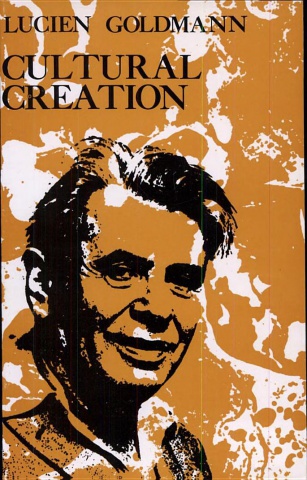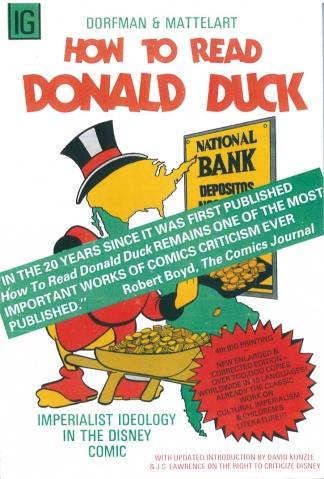Lucien Goldmann: Cultural Creation in Modern Society (1971/1976)
Filed under book | Tags: · Frankfurt school, marxism, mass media, philosophy, proletariat, sociology

These six essays offer an excellent overview of Goldmann’s philosophy and sociology. They include not only some of his last writings on mass media and mass culture, new forms of literary creativity, and avant-garde theatre and cinema, but also some of his last thoughts on the problems of social change and political organization in advanced capitalist society. (from the Introduction)
Also included are commentaries on Goldmann’s work by Jean Piaget and Herbert Marcuse.
Originally published as La Création culturelle dans la société moderne, Denoel, Paris, 1971
Introduction by William Mayrl
Translated by Bart Grahl
Bibliography and Appendices compiled by Ileana Rodriguez and Marc Zimmerman
Publisher Telos Press, St. Louis, MI, 1976
ISBN 0631182209
173 pages
via fading aesthetic
Commentary (Miriam Glucksmann, New Left Review, 1969)
PDF (updated to an OCR’d version on 2014-5-8 via Marcell Mars)
Comment (0)Ariel Dorfman, Armand Mattelart: How to Read Donald Duck: Imperialist Ideology in the Disney Comic (1972–) [ES, IT, EN, PT, TR]
Filed under book | Tags: · capitalism, colonialism, comics, cultural criticism, entertainment, ideology, literary criticism, marxism, political theory, politics

How to Read Donald Duck is a Marxist political analysis by Ariel Dorfman and Armand Mattelart on what they perceive is cultural imperialism in popular entertainment, published in Chile in 1972. Written in the form of essay (or, in the authors’ words, a “decolonization manual”), the book is an analysis of mass literature, specifically the Disney comics published for the Latin American market. It is one of the first social studies of entertainment and the leisure industry from a political-ideological angle, and the book deals extensively with the political role of children’s literature. (from Wikipedia)
First published by Ediciones Universitarias de Valparaíso, Chile, 1972
First published in English in 1975
Translated and with an Introduction by David Kunzle
With Appendix by John Shelton Lawrence
Publisher International General, New York, 1991 (Fourth printing)
ISBN 0884770370
119 pages
via Quaxo Coricopat
An interview with Mattelart in which he shortly discusses the book (2008, in English)
2012 project for appropriation of the book (includes its online edition)
Para leer al Pato Donald. Comunicación de masa y colonialismo (Spanish, 18th ed., 1972/1979)
Come leggere Paperino. Ideologia e politica nel mondo di Disney (Italian, trans. Gianni Guadalupi, 1972, added on 2023-7-31)
How to Read Donald Duck: Imperialist Ideology in the Disney Comic (English, trans. David Kunzle, 1975/1991, 10 MB, updated 2015-5-10)
Para ler o Pato Donald: comunicação de massa e colonialismo (Portuguese, trans. Álvaro de Moya, 2nd ed., 1976/1980)
Emperyalist Kültür Sanayii ve Walt Disney: Vakvak Amca Nasıl Okunmalı? (Turkish, trans. Atilla Aksoy, 1977)
Martin Puchner: Poetry of the Revolution: Marx, Manifestos, and the Avant-Gardes (2005)
Filed under book | Tags: · aesthetics, art, art history, avant-garde, communism, dada, futurism, literature, marxism, politics, revolution, situationists, surrealism, theatre

“Poetry of the Revolution tells the story of political and artistic upheavals through the manifestos of the nineteenth and twentieth centuries. Ranging from the Communist Manifesto to the manifestos of the 1960s and beyond, it highlights the varied alliances and rivalries between socialism and repeated waves of avant-garde art. Martin Puchner argues that the manifesto–what Marx called the ‘poetry’ of the revolution–was the genre through which modern culture articulated its revolutionary ambitions and desires. When it intruded into the sphere of art, the manifesto created an art in its own image: shrill and aggressive, political and polemical. The result was “manifesto art”–combinations of manifesto and art that fundamentally transformed the artistic landscape of the twentieth century.
Central to modern politics and art, the manifesto also measures the geography of modernity. The translations, editions, and adaptations of such texts as the Communist Manifesto and the Futurist Manifesto registered and advanced the spread of revolutionary modernity and of avant-garde movements across Europe and to the Americas. The rapid diffusion of these manifestos was made “possible by networks–such as the successive socialist internationals and international avant-garde movements–that connected Santiago and Zurich, Moscow and New York, London and Mexico City. Poetry of the Revolution thus provides the point of departure for a truly global analysis of modernism and modernity.”
Publisher Princeton University Press, 2005
Translation/Transnation series
ISBN 1400844126, 9781400844128
336 pages
via delery
Reviews: Gregory Byala (Bryn Mawr Review of Comparative Literature), Randy Martin (The Drama Review), Matthew Rebhorn (Modern Drama), Laura A. Winkiel (Modernism/Modernity), Gavin Grindon (Papers of Surrealism).
PDF (16 MB, updated on 2017-6-18)
See also the entry on Marxist aesthetics on Monoskop wiki.
Comment (0)
